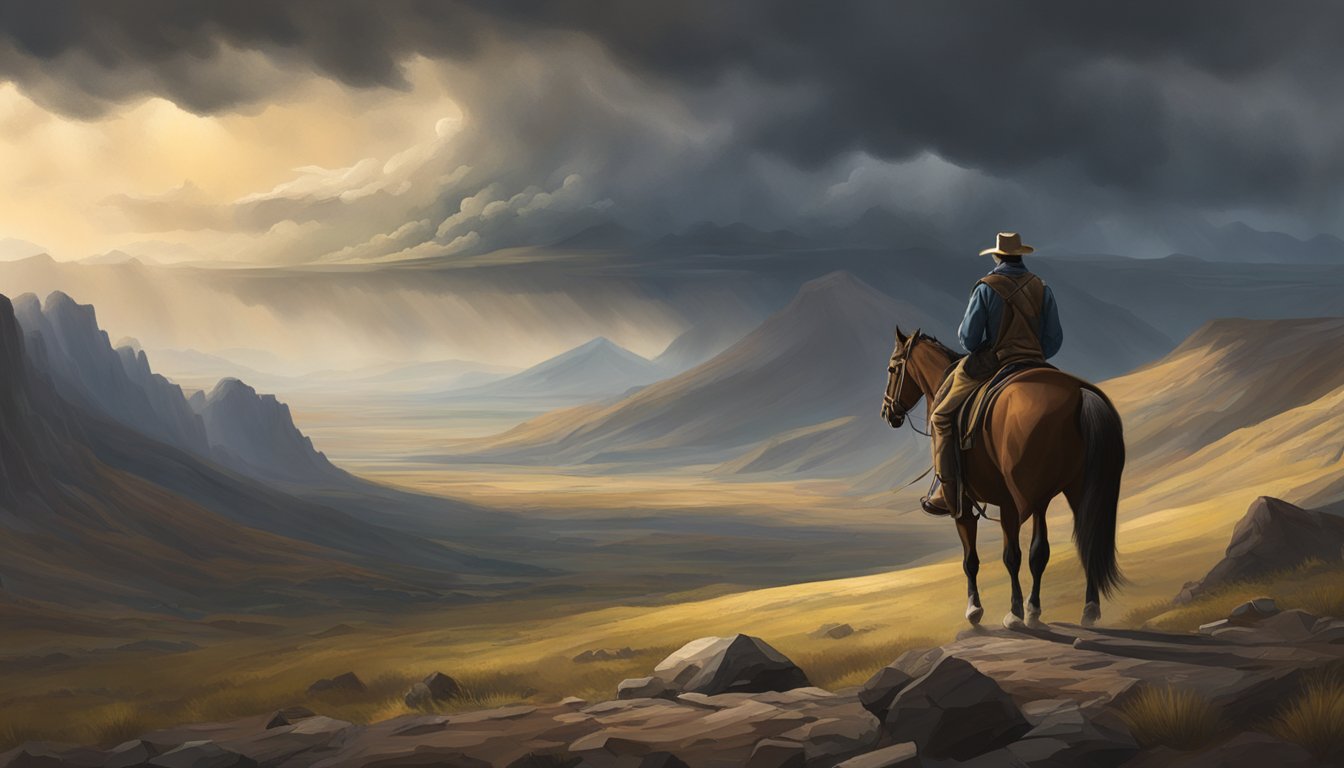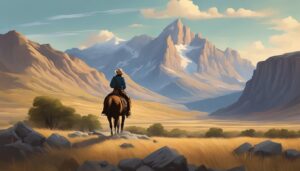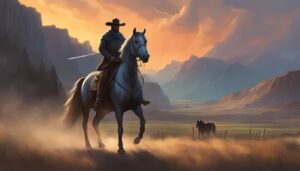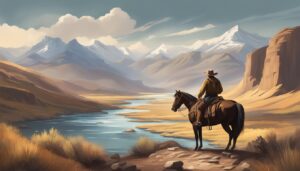Western heroes have captivated audiences for decades, embodying the rugged individualism and moral fortitude of the American frontier. Two iconic figures stand out in this genre: Yellowstone’s John Dutton and High Noon’s Will Kane. Both characters face immense challenges and tough decisions, showcasing the complexities of leadership in their respective eras.
John Dutton, portrayed by Kevin Costner in Taylor Sheridan’s Yellowstone, represents a modern take on the Western hero. He grapples with preserving his family’s legacy and vast ranch while navigating the complexities of 21st-century politics and business. Dutton’s ability to adapt traditional cowboy values to contemporary challenges makes him a compelling and relevant hero for today’s audiences.
Will Kane, the protagonist of the 1952 classic High Noon, faces a more immediate threat as he prepares to confront a gang of killers alone. His unwavering commitment to duty and justice, even when abandoned by his community, exemplifies the archetypal Western hero. Both Dutton and Kane demonstrate remarkable courage and determination, leaving viewers to ponder which character truly embodies the more impressive Western hero.
John Dutton: The Patriarch of Yellowstone

John Dutton, portrayed by Kevin Costner, stands as the formidable center of the Yellowstone universe. His character embodies the complexities of a modern rancher fighting to preserve his family’s legacy in a changing world.
Character Analysis and Depth
John Dutton’s character is a masterful blend of strength and vulnerability. As the patriarch of the Dutton family, he exudes a commanding presence on the Yellowstone Ranch. His unwavering dedication to preserving his land and way of life drives the show’s central conflicts.
Kevin Costner brings depth to John’s character, showcasing both his iron will and hidden emotional wounds. John’s interactions with his children, particularly Beth Dutton, reveal layers of complexity in their relationships.
The character’s moral ambiguity adds intrigue. John often operates in gray areas, willing to bend rules to protect his interests. This complexity makes him a captivating and unpredictable figure throughout the series.
Impact on the Dutton Family Legacy
John Dutton’s influence on his family’s legacy is profound and far-reaching. As the current steward of the Yellowstone Ranch, he carries the weight of generations on his shoulders.
His determination to keep the ranch intact shapes every decision he makes. This singular focus often puts him at odds with his children, creating intense family dynamics.
John’s leadership style blends traditional values with ruthless business acumen. He instills in his children a fierce loyalty to the Dutton name and land, ensuring the continuation of their legacy.
The patriarch’s actions ripple through the lives of all Duttons, influencing their choices and relationships. His impact extends beyond family, affecting the local community and Montana’s political landscape.
Representation of the Modern Western Hero
John Dutton embodies a new type of Western hero, adapted for the 21st century. He represents the evolution of the cowboy archetype in the neo-Western genre.
Unlike traditional Western heroes, John navigates complex modern challenges. He faces threats from corporations, developers, and changing societal norms while clinging to his ranching roots.
Costner’s portrayal brings authenticity to the role, bridging the gap between classic Western values and contemporary issues. John’s character resonates with viewers by addressing real concerns of land preservation and cultural shifts in rural America.
His moral ambiguity sets him apart from traditional black-and-white depictions of Western heroes. John’s willingness to use both legal and illegal means to protect his interests reflects the complexities of modern rural life.
Will Kane: The Emblem of Classic Westerns

Will Kane stands as an iconic figure in Western cinema, embodying the quintessential lone hero facing overwhelming odds. His portrayal in High Noon set a new standard for protagonists in the genre.
Will Kane’s Character and Moral Compass
Will Kane, played by Gary Cooper in High Noon, represents a departure from typical Western heroes. Unlike the invincible gunslingers of earlier films, Kane is vulnerable and conflicted. He struggles with fear and doubt as he prepares to face a gang of outlaws alone.
Despite his apprehension, Kane’s unwavering sense of duty compels him to stay and protect the town. This moral fortitude sets him apart from both his predecessors and successors in Western cinema.
Kane’s internal conflict adds depth to his character. He grapples with the decision to abandon his new bride and potentially sacrifice his life for a town that has turned its back on him.
Influence on Western Genre Films
High Noon and Will Kane’s character had a profound impact on the Western genre. The film challenged traditional portrayals of heroism, paving the way for more complex protagonists in future Westerns.
Kane’s vulnerability and moral dilemma inspired a shift towards more nuanced characters in films like The Searchers and later revisionist Westerns. His portrayal encouraged filmmakers to explore the psychological aspects of their heroes.
The concept of a lone hero standing against insurmountable odds became a recurring theme in Westerns. However, few matched the intensity and moral complexity of Kane’s struggle in High Noon.
Narrative and Storytelling Strategies

Yellowstone and High Noon employ distinct narrative approaches to engage viewers. Each uses unique storytelling techniques to develop characters and build tension within their Western settings.
Dutton Family Dynamics and Conflict
Yellowstone centers on the complex relationships within the Dutton family. John Dutton leads his children through power struggles and external threats. The show weaves multiple storylines, exploring loyalty, betrayal, and the fight for legacy.
Beth Dutton’s fierce personality adds depth to family interactions. Her conflicts with brothers Jamie and Kayce create ongoing tension. Taylor Sheridan’s writing emphasizes moral ambiguity, avoiding clear-cut heroes and villains.
The ranch itself becomes a character, shaping decisions and driving plot points. This approach allows for rich character development over multiple seasons.
High Noon’s Tension and Real-Time Storytelling
High Noon utilizes a real-time narrative structure to build suspense. The story unfolds over 85 minutes, mirroring the actual time until the climactic showdown. This technique creates a sense of urgency and immediacy.
Will Kane’s isolation grows as he seeks help from townspeople. Each rejection ratchets up the tension. The ticking clock becomes a tangible presence, driving the plot forward.
The film’s narrow focus on Kane’s moral dilemma allows for deep character exploration. His internal struggle is reflected in external conflicts with the town and his wife. This concentrated storytelling approach heightens the emotional impact of Kane’s choices.
Cultural Impact and Legacy

Yellowstone and High Noon have both left indelible marks on the Western genre, influencing popular culture and shaping audience perceptions of the American frontier. Their protagonists, John Dutton and Will Kane, embody different aspects of heroism that resonate with viewers across generations.
Yellowstone’s Influence on Television Westerns
Yellowstone has revitalized interest in Western-themed television. The show’s portrayal of modern ranch life and family dynamics has captured audiences nationwide. John Dutton’s character, a powerful landowner fighting to preserve his legacy, reflects contemporary concerns about land rights and family loyalty.
Yellowstone’s success has sparked a surge in neo-Western productions. The series has inspired fashion trends, with viewers emulating the characters’ rugged style. Montana tourism has also seen a boost, as fans seek to experience the show’s picturesque landscapes firsthand.
High Noon’s Role in Shaping Western Canon
High Noon, released in 1952, redefined the Western genre with its tight narrative and moral complexity. Will Kane’s lone stand against outlaws challenged traditional notions of heroism. The film’s real-time structure and exploration of duty versus self-preservation set new standards for storytelling.
High Noon’s impact extends beyond cinema. Its themes of individual courage and community responsibility continue to resonate in political and social discourse. The film’s stark black-and-white visuals and tense countdown have become iconic, influencing countless subsequent Westerns and action movies.
Themes of Law, Morality, and Justice
John Dutton and Will Kane represent contrasting approaches to justice in the Western genre. Their methods and motivations highlight the complex moral landscape of frontier society.
John Dutton’s Ruthlessness vs. Will Kane’s Integrity
John Dutton’s approach to justice often blurs ethical lines. He uses his power and influence to protect his ranch, sometimes resorting to questionable tactics. Dutton’s actions stem from a desire to preserve his family legacy and way of life in Montana.
Will Kane, on the other hand, embodies unwavering moral integrity. In “High Noon,” Kane faces a deadly threat alone, choosing to stand up for what’s right despite overwhelming odds. His commitment to justice is rooted in personal conviction rather than self-interest.
Both characters navigate treacherous territories, but their methods differ greatly. Dutton’s ruthlessness contrasts sharply with Kane’s principled stance.
The Quest for Justice in a Lawless Land
The settings of “Yellowstone” and “High Noon” showcase the challenges of upholding justice in frontier societies. John Dutton operates in a modern Montana where old ways clash with new laws. He often takes matters into his own hands, viewing official channels as inadequate for protecting his interests.
Will Kane faces a more traditional Western scenario. He stands alone against outlaws in a town that has abandoned him. Kane’s quest for justice is a personal crusade against lawlessness and cowardice.
Both characters grapple with the limitations of formal legal systems in their respective eras. They illustrate how individuals might step in when institutions fail, raising questions about the nature of true justice in challenging environments.
The Antihero and American Culture

Antiheroes have become a prominent fixture in American entertainment, challenging traditional notions of heroism and morality. These complex characters reflect shifting cultural values and societal tensions.
John Dutton as a Neo-Western Antihero
John Dutton, portrayed by Kevin Costner in Yellowstone, embodies the neo-Western antihero archetype. He stands as a modern patriarch, fiercely protecting his family’s legacy and land through morally ambiguous means. Dutton’s character is shaped by violence and a deep-rooted sense of purpose.
His actions often blur the line between right and wrong, resonating with viewers who see reflections of America’s current struggles. Dutton’s complexity stems from his relatable motivations and flawed decision-making, making him a compelling figure in the Western genre.
Will Kane’s Clash with Antihero Tropes
Will Kane from High Noon represents a more traditional Western hero, contrasting sharply with the antihero trend. Kane’s unwavering moral compass and commitment to duty set him apart from characters like John Dutton.
Unlike modern antiheroes, Kane faces his challenges with a clear sense of right and wrong. His steadfast resolve in the face of abandonment by his community highlights the disconnect between classic Western ideals and the complexities of real-world morality.
Kane’s character serves as a counterpoint to the moral ambiguity often celebrated in neo-Westerns, challenging viewers to reconsider traditional heroic values in contemporary contexts.
Depiction of True Grit and Perseverance

Both John Dutton and Will Kane embody unwavering determination in their respective narratives. These characters face immense challenges that test their resolve and showcase their inner strength.
John Dutton’s Fight for the Yellowstone Ranch
John Dutton’s struggle to preserve the Yellowstone Ranch exemplifies true grit. He faces constant threats from developers, rival ranchers, and government entities seeking to claim his land. Dutton’s fierce loyalty to his family legacy drives him to make difficult decisions and take extreme measures.
His perseverance is evident in his relentless efforts to protect the ranch at all costs. Dutton navigates complex political landscapes and engages in strategic maneuvering to maintain control of his property. He often relies on his right-hand man, Rip Wheeler, to handle the more unscrupulous aspects of ranch protection.
Dutton’s resilience is tested through personal tragedies and business setbacks. Yet, he remains steadfast in his commitment to preserving the Yellowstone Ranch for future generations.
Will Kane’s Standoff as a Symbol of Determination
Will Kane’s unwavering resolve in “High Noon” serves as a powerful symbol of determination. As the town marshal, Kane faces a deadly confrontation with a gang of outlaws seeking revenge. Despite the urging of townspeople to flee, Kane chooses to stand his ground and protect the community.
Kane’s perseverance is evident as he prepares for the impending showdown, knowing he may face the threat alone. His loyalty to his principles and sense of duty supersede his personal safety and newly married status.
The marshal’s actions throughout the film demonstrate his unwavering commitment to justice. Kane’s determination to confront the danger head-on, even as others abandon him, showcases his true grit in the face of overwhelming odds.
Factors of Popularity and Critical Reception

Yellowstone and High Noon have both achieved significant popularity and critical acclaim, though through different means and in different eras. Their success can be attributed to various factors that resonated with audiences and critics alike.
Audience Appeal and Ratings
Yellowstone has become a ratings juggernaut since its 2018 debut. The show consistently draws millions of viewers, making it one of the most-watched cable series. Its appeal stems from its modern take on the Western genre, complex characters, and stunning visuals of Montana landscapes.
Kevin Costner’s star power as John Dutton has been a major draw for audiences. The multi-generational family drama and power struggles resonate with viewers across demographics.
High Noon, released in 1952, was a box office success and has since become a classic Western. Its real-time narrative and psychological tension set it apart from typical Westerns of its era. Will Kane’s moral dilemma and Gary Cooper’s stoic performance captivated audiences.
Awards and Achievements
Yellowstone has garnered numerous award nominations, particularly for its acting performances. Kevin Costner won a Golden Globe for Best Actor in a Television Series – Drama in 2023. The show has also received recognition for its cinematography and production design.
High Noon achieved even greater critical acclaim. It won four Academy Awards, including Best Actor for Gary Cooper. The film’s editing, score, and song “Do Not Forsake Me, Oh My Darlin'” were also honored with Oscars.
The film’s cultural impact has been significant, with its themes and storytelling techniques influencing generations of filmmakers. It was selected for preservation in the United States National Film Registry by the Library of Congress in 1989, recognizing its cultural, historical, and aesthetic significance.
The Future of Westerns in Media
The Western genre continues to evolve, adapting to modern audiences while maintaining its core themes. New creators and fresh perspectives are reshaping the landscape of Western storytelling.
Evolving Tropes and Audience Expectations
Modern Westerns like “Yellowstone” have redefined traditional tropes, introducing complex characters and contemporary issues. Audiences now expect nuanced portrayals of the American West, moving beyond simplistic good-versus-evil narratives. Neo-Westerns blend classic elements with current societal concerns, tackling themes like land rights, family dynamics, and political intrigue.
These shows often feature morally ambiguous protagonists, reflecting the complexity of real-world decisions. The classic Western hero archetype has transformed, with characters like John Dutton embodying both traditional values and modern conflicts. This evolution has attracted a broader audience, including younger viewers who may not have previously engaged with the genre.
The Role of Creators like Taylor Sheridan
Taylor Sheridan’s influence on the Western genre has been significant, with “Yellowstone” serving as a prime example of the neo-Western’s potential. Sheridan’s approach combines gritty realism with compelling storytelling, creating a template for future Western productions.
His success has inspired other creators to explore the genre, leading to a resurgence of Western-themed content across various media platforms. Sheridan’s work demonstrates the enduring appeal of Western themes when presented in a contemporary context. This trend is likely to continue, with more creators experimenting with the genre’s conventions and pushing its boundaries.
The future of Westerns in media looks promising, with opportunities for diverse stories and perspectives within the genre’s framework.



